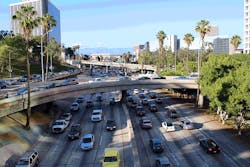A coalition of international automakers, including General Motors, Toyota, and Fiat Chrysler, have reversed course and are siding with the Trump administration in a legal battle with California over fuel-economy standards for automobiles.
The three companies, plus a trade association called the Association of Global Automakers, plan to intervene in a lawsuit filed by the Environmental Defense Fund against the administration, which is seeking to revoke California’s congressionally granted authority to set standards that are stricter than those issued by federal regulators.
The administration is challenging California’s long-held authority to set tailpipe emissions under the Clean Air Act, saying that the federal government, not California, has the ultimate authority to set fuel-economy standards for passenger cars and trucks.
The automakers changed their stance to siding with the Trump administration against the state. The group, called the "Coalition for Sustainable Automotive Regulation," also includes Nissan, Hyundai, Kia, Isuzu, Maserati, McLaren, Aston-Martin and Ferrari.
The Association of Global Automakers is a trade association based in Washington, D.C. that represents the U.S. operations of international motor-vehicle manufacturers, original equipment suppliers, and other automotive-related companies and trade associations.
Said John Bozzella, CEO of Global Automakers and spokesman for the coalition, “The certainty of one national program, with reasonable, achievable standards, is the surest way to reduce emissions in the timeliest manner,” adding “with our industry facing the possibility of multiple, overlapping and inconsistent standards that drive up costs and penalize consumers, we had an obligation to intervene.”
The automakers decision pits them against leading competitors like Honda, Ford, Volkswagen, and BMW, which have sided with California in the battle. In July, these automakers completed a deal with California regulators to meet standards that are slightly less restrictive than the Obama standards, and that they could apply to vehicles sold nationwide.
A typical Los Angeles highway scene. California is trying to maintain its authority under the Clean Air Act to establish emissions rules.
In a statement, Honda, a member of Global Automakers, distanced itself from that group’s intervention. “Honda is not a participant in this litigation,” said the company, noting that Honda’s vehicle greenhouse gas standards have already been established through model year 2026 based on the stricter standards agreed on with California.
The Obama-era national fuel economy standard would require automakers to build vehicles that achieve an average fuel economy of 54.5 miles per gallon by 2025. The Trump administration has proposed freezing federal standards at 2021 levels until 2025, with final rules expected by 2020.
This prompted California to declare that it will go its own way and keep enforcing the earlier, stricter standards. The State then took the Trump administration to court, saying that it has the right to write its own clean-air rules under the Clean Air Act passed in 1963. Several other states have pledged to follow California’s lead in enforcing stricter standards for auto emissions.
The legal fight between the Trump administration and California over auto pollution rules has swelled into a battle over states’ rights, which is likely to only be resolved once it reaches the Supreme Court.


